四川省泸州市2012年中考试题(英语)(WORD版含答案)
- 格式:pdf
- 大小:112.56 KB
- 文档页数:11
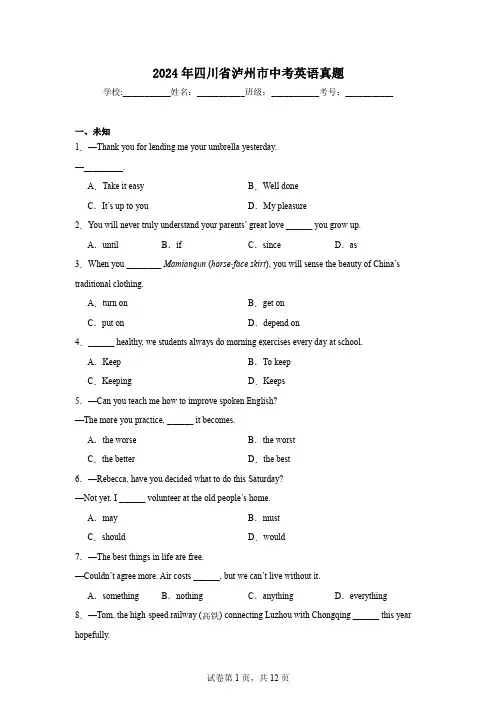
2024年四川省泸州市中考英语真题学校:___________姓名:___________班级:___________考号:___________一、未知1.—Thank you for lending me your umbrella yesterday.—_________.A.Take it easy B.Well doneC.It’s up to you D.My pleasure2.You will never truly understand your parents’ great love ______ you grow up.A.until B.if C.since D.as3.When you ________ Mamianqun (horse-face skirt), you will sense the beauty of China’s traditional clothing.A.turn on B.get onC.put on D.depend on4.______ healthy, we students always do morning exercises every day at school.A.Keep B.To keepC.Keeping D.Keeps5.—Can you teach me how to improve spoken English?—The more you practice, ______ it becomes.A.the worse B.the worstC.the better D.the best6.—Rebecca, have you decided what to do this Saturday?—Not yet. I ______ volunteer at the old people’s home.A.may B.mustC.should D.would7.—The best things in life are free.—Couldn’t agree more. Air costs ______, but we can’t live without it.A.something B.nothing C.anything D.everything 8.—Tom, the high-speed railway (高铁) connecting Luzhou with Chongqing ______ this year hopefully.— Amazing! I’m looking forward to it!A.completes B.is completedC.was completed D.will be completed9.—Hi, Ethan. I called you at 8:00 last night, but you didn’t answer.—Sorry, I ______ the dishes.A.wash B.washedC.am washing D.was washing10.A true friend is a person ________ will always be there to share your laughter and tears.A.what B.which C.who D.whomThe history of the compass (指南针) dates back to the Warring States Period (476—221 BC), when Chinese people used a tool called Si Nan to point the direction.After continuous improvement, a round compass a tiny magnetized needle (磁针) was invented during the early Song Dynasty. One end of the needle points to the south and the other to the north. Then it was to Europe during the Northern Song (960—1127).Before the invention of the compass, people depended on reading the of the sun, the moon, and pole stars to tell directions. However, travelling was in bad weather.After the invention, people could easily find a direction when going out to sea and exploring unknown areas.The invention of the compass has a strong influence on the world. The compass hugely the trade and communication between countries.11.A.in B.with C.of D.at 12.A.borrowed B.pushed C.returned D.introduced 13.A.positions B.numbers C.sizes D.colors 14.A.lonely B.difficult C.tiring D.meaningless 15.A.controlled B.checked C.improved D.recordedWhen I was turning thirty years old, a friend asked me to share my biggest in life. It only took me a(n) to say I most regretted not completing college. I explained that I was considered to be in school, got great grades, and had big dreams. finishing university, I felt like I was not only letting myself down, but also everyone who believed in me.My friend said, “Why not now?” But with a son in primary school, a busy job, and lots of other responsibilities at home, I had a million . The one I thought was the strongest: If I went back, I would be thirty-two I graduated. What I heard was something I would never : “You’re going to be thirty-two anyway (无论如何).”Looking back, I feel it’s the and wisest advice I have ever received.I would turn thirty-two with a college degree (学位) or without one anyway. So I to continue my study.I graduated from university and felt proud of myself. And I have reviewed this many times. I believe it’s never too late for me to do anything except becoming a teenager.Do I really want to my first book in my forties? I’m going to be forty anyway.Do I really want to run a half marathon (马拉松) in my fifties? I’m going to be fifty anyway.Do I really want to travel around the in my sixties? I’m going to be sixty anyway.I hope you never hear me say, “I’m too old for that.” , I hope you hear me say, “I’m going to be seventy anyway.”It’s never too to start something new, to do all those things that you’ve been wishing to do.16.A.regret B.happiness C.role D.success 17.A.week B.day C.hour D.minute 18.A.lovely B.polite C.smart D.friendly 19.A.Giving up B.Making up C.Ending up D.Taking up 20.A.ways B.reasons C.chances D.steps 21.A.although B.because C.unless D.when 22.A.reply B.accept C.forget D.guess 23.A.simplest B.funniest C.strangest D.coldest 24.A.happened B.decided C.helped D.failed25.A.smoothly B.patiently C.silently D.suddenly 26.A.activity B.promise C.plan D.suggestion 27.A.read B.write C.buy D.choose 28.A.university B.city C.village D.world 29.A.Finally B.Besides C.Instead D.Also 30.A.dangerous B.poor C.late D.slowKoalas are cute and easy to recognize, with fluffy ears and a large, spoon-shaped nose. They’re popular with people.They used to be common across Australia, but the last 200 years haven’t been good for them. Their forests have been cut down and burnt in bushfires. Now, koalas are endangered, so it’s necessary to make sure of koala populations by counting (数) them in different areas. This information can be used to find out where help is most needed. Then it’ll become much easier to protect them and their homes.HOW TO COUNT KOALAS We can count koalas in different ways, such as:·walking around and looking from the ground·sending up drones to look from the sky·recording koala calls·using trained dogs.HELP COUNT KOALAS! YOU WILL NEED·A smartphone·Walking shoes, a hat and a backpack·Binoculars (望远镜).Safety: Ask parents before you go into the forest.When you are outdoors, remember to be sun safe with a hat.WHAT TO DO TO COUNT KOALAS·Fill in your personal information in Koala Spotter(an App).·Go out to the forest and search for koalas. Look up carefully in the trees.·Report any koala sightings in the app.·Remember to record when you don’t see a koala.31.Why is it necessary to count koalas?A.Because people love them so much.B.Because they are easy to recognize.C.Because they are common across Australia.D.Because their population information is helpful.32.How many ways are there to count koalas?A.2.B.3.C.4.D.5.33.Which of the following is NOT needed to count koalas?A.A hat.B.A watch.C.A smartphone.D.A backpack.34.What should be done first to count koalas?A.Search for koalas.B.Go out to the forest.C.Record when not seeing a koala.D.Fill in personal information.35.Who is the passage most probably written for?A.Teenagers.B.Workers.C.Teachers.D.Keepers.What year were you born in? Are you a dragon? That is to say, were you born in the Year of the Dragon?As we know, the Year of the Dragon has arrived with us for a while, and everyone is excited about talking about dragons. Many of them have noticed that more and more people are using the word “loong” instead of “dragon” in their daily life. Actually, the loongs in Chinese culture, believe it or not, are far different from the dragons in Western culture.First, let’s talk about their origins (起源). Loongs are connected to stars and rain. They are believed to have to do with the power of emperors in the past. Dragons, however, are related to floods and dangerous waters underground.Second, let’s dig into their stories. Loongs are like messengers between the sky and the earth. They help out the rulers, who become kings because of them. Dragons, though, are troublemakers. They fight with the rulers and can even beat them! But as time passes, dragons lose their shine and heroes start killing them.Third, let’s look at what they mean. Since loongs represent (代表) power, they are seen as a symbol of the emperor and an important part of ceremonies and traditions. Dragons, though, are bad news. They are a symbol of evil (恶), and beating the dragons is seen as a victory over evil.Lastly, let’s check out how they look. Loongs are like a mix of animals, with heads like camels and necks like snakes. They don’t need wings to fly because they are already skilled at it. Dragons are more like snakes, living underground and causing problems. They don’t have wings either, but people add those to make them look more impressive.36.Why does the writer start the passage by asking questions?A.To make a report.B.To do a survey.C.To introduce a normal year.D.To catch readers’ interests.37.What are loongs connected with according to the passage?A.Stars and the moon.B.The power of emperors.C.Troublemakers and evil.D.Dangerous waters underground.38.What does the underlined word “them” in Paragraph 4 refer to?A.Rulers.B.Snakes.C.Heroes.D.Loongs. 39.What can we learn from the passage?A.Loongs have wings.B.Dragons are good news.C.Loongs are used in ceremonies.D.Dragons’ heads are like camels. 40.What’s the main idea of the passage?A.The origins of dragons and loongs.B.The meanings of dragons and loongs.C.The stories between dragons and loongs.D.The differences between dragons and loongs.Anna Mary Robertson was a famous American painter. It is often said that Anna first tookup painting when she was nearly 80 years old. In fact, when she was a little girl, she drew whenever she had a chance.Long before she became known, Anna lived a life full of challenges. She always kept busy with farm chores, housework, and children, but she never really stopped pursuing (追求) art.In Anna’s late age, she pictured some scenes in her mind before painting. She would close her eyes and recall a happy time from her early life. She would remember helping her father on the farm. She would see the people, the farm buildings, and the animals. She would imagine the blue mountains and the softly falling snow.Anna’s friends and family members loved the paintings. She gave them away as gifts. A friend hung several of the paintings in a local store. One day a stranger came into the store and bought every one of her paintings. He took her paintings to New York City and showed them to some art collectors. One of these collectors, Dr. Kallir, liked the paintings. He hung some of them in his gallery (画廊). The newspaper did a story about the art show. The reporter called Anna “Grandma Moses.” From then on almost everyone called her that way. Grandma Moses kept on painting. Her paintings got better, and they got more popular.In her lifetime, Moses created about 1,500 works of art. They were cheerful, warm and full of life, just like Grandma herself. Her paintings still remain popular today.“As I look back on my life, it’s like a good day’s work. It was done and I feel satisfied with it. I knew nothing better than painting and made full use of what life offered. And life is what we make it, always has been, always will be,” she said.41.When did Anna first take up painting?A.When she was a little girl.B.When she was about 80 years old.C.When she saw the blue mountains.D.When she helped her father on the farm.42.According to Paragraph 3, what’s the main theme of Anna’s paintings?A.Farming.B.Animals.C.Country life.D.Family members.43.What’s the correct order of the following events?①Anna was known to the public.①Anna’s friends received her paintings as gifts.①An art show about Anna’s paintings was reported.①A man brought Anna’s paintings to New York City.A.①①①①B.①①①①C.①①①①D.①①①①44.Which of the following words can best describe Anna?A.Honest and friendly.B.Outgoing and independent.C.Clever and well-educated.D.Creative and hard-working.45.In which part of a magazine can we read this passage?A.Language and culture.B.Art and people.C.Nature and environment.D.Science and technology.We all want to do things well. For example, as students all of us want to have a good performance in study and get good grades. However, growing up also includes accepting when things go wrong. In fact, mistakes can lead to some of the most interesting and meaningful results.Aiming for good results can help you focus on (关注) your goals, but it’s also important to focus on enjoying the process. Getting too hung up on whether things go as planned can put a lot of pressure on you and lead to worry. That’s why it’s good to leave some room for mistakes and imperfections.Dr. Rekha Vara is a doctor who helps people with their mental health (心理健康). She says getting things wrong is part of growing up. “We also have to experience the uncomfortable feeling when we get things wrong. This helps us to become stronger,” says Dr. Vara. “Or we’ll be too scared to make mistakes. This fear can lead us to put off doing difficult things or avoid trying new things.”Learning from your mistakes is necessary during growing up. The most important thing is what you choose to do next. Try not to take it too seriously, blame (责备) yourself or feel too disappointed or upset. Dr. Vara explains, “Remember you’re a common man. Humans make mistakes.” ______, then these feelings will soon pass and then you’ll feel happier.Instead, thinking about what you might do differently next time helps a lot. In one study, if students were reminded to forgive (宽恕) and be kind to themselves when they failed a test, they felt more encouraged to try again, while other students were less pleased to have a second try.46.What does the underlined part in Paragraph 2 probably mean?A.执迷B.懊悔C.遗憾D.忽略47.Which of the following would Dr. Vara agree with?A.Fear leads us to try new things.B.Failure is normal in growing up.C.Good results make us stronger.D.People hardly ever get things wrong.48.Which of the following can be put in “______” in Paragraph 4?A.Everyone will grow up B.Process is really importantC.You should enjoy your feelings D.You might feel uncomfortable at first 49.How does the writer support his idea in the last Paragraph?A.By telling stories.B.By giving an example.C.By listing numbers.D.By describing a problem.50.What’s the best title for the passage?A.Stick to your goals B.Avoid making mistakesC.Imperfection can be a gift D.Pressure is the key to success二、补全对话根据对话内容,在每个空缺处填入一个适当的词,使整段对话意思完整。
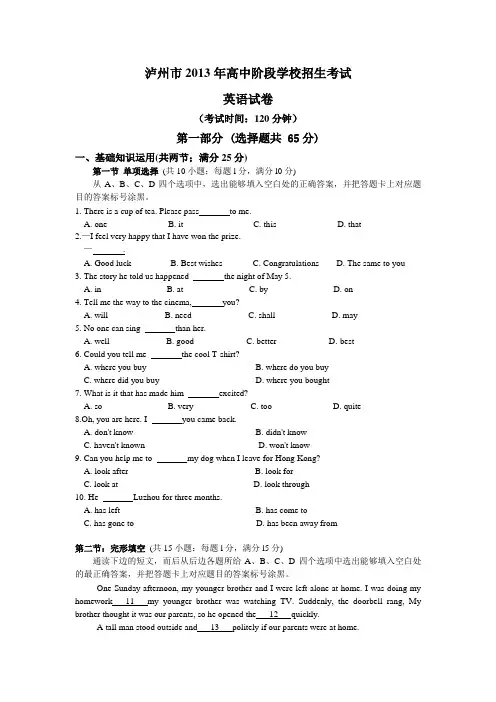
泸州市2013年高中阶段学校招生考试英语试卷(考试时间:120分钟)第一部分 (选择题共 65分)一、基础知识运用(共两节;满分25分)第一节单项选择(共10小题;每题l分,满分l0分)从A、B、C、D四个选项中,选出能够填入空白处的正确答案,并把答题卡上对应题目的答案标号涂黑。
1. There is a cup of tea. Please pass to me.A. oneB. itC. thisD. that2.—I feel very happy that I have won the prize.—.A. Good luckB. Best wishesC. CongratulationsD. The same to you3. The story he told us happened the night of May 5.A. inB. atC. byD. on4. Tell me the way to the cinema, you?A. willB. needC. shallD. may5. No one can sing than her.A. wellB. goodC. betterD. best6. Could you tell me the cool T-shirt?A. where you buyB. where do you buyC. where did you buyD. where you bought7. What is it that has made him excited?A. soB. veryC. tooD. quite8.Oh, you are here. I you came back.A. don't knowB. didn't knowC. haven't knownD. won't know9. Can you help me to my dog when I leave for Hong Kong?A. look afterB. look forC. look atD. look through10. He Luzhou for three months.A. has leftB. has come toC. has gone toD. has been away from第二节:完形填空(共15小题:每题l分,满分l5分)通读下边的短文,而后从后边各题所给A、B、C、D四个选项中选出能够填入空白处的最正确答案,并把答题卡上对应题目的答案标号涂黑。
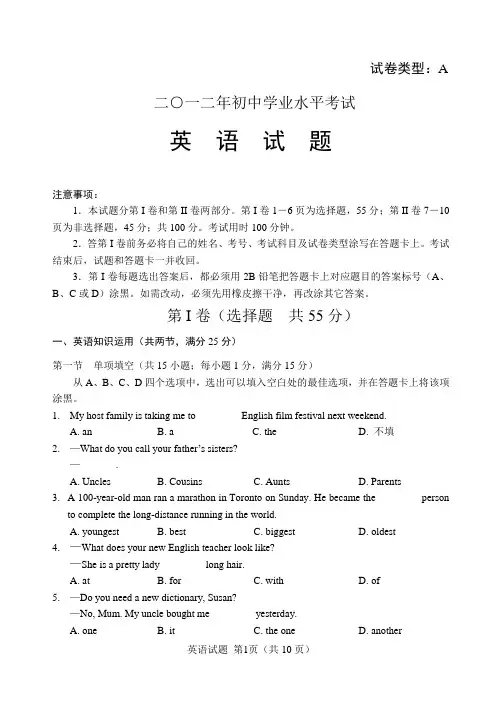
试卷类型:A二○一二年初中学业水平考试英语试题注意事项:1.本试题分第I卷和第II卷两部分。
第I卷1-6页为选择题,55分;第II卷7-10页为非选择题,45分;共100分。
考试用时100分钟。
2.答第I卷前务必将自己的姓名、考号、考试科目及试卷类型涂写在答题卡上。
考试结束后,试题和答题卡一并收回。
3.第I卷每题选出答案后,都必须用2B铅笔把答题卡上对应题目的答案标号(A、B、C或D)涂黑。
如需改动,必须先用橡皮擦干净,再改涂其它答案。
第I卷(选择题共55分)一、英语知识运用(共两节,满分25分)第一节单项填空(共15小题;每小题1分,满分15分)从A、B、C、D四个选项中,选出可以填入空白处的最佳选项,并在答题卡上将该项涂黑。
1. My host family is taking me to ________ English film festival next weekend.A. anB. aC. theD. 不填2. —What do you call your father’s sisters?—_______.A. UnclesB. CousinsC. AuntsD. Parents3. A 100-year-old man ran a marathon in Toronto on Sunday. He became the ________ personto complete the long-distance running in the world.A. youngestB. bestC. biggestD. oldest4. —What does your new English teacher look like?—She is a pretty lady ________ long hair.A. atB. forC. withD. of5. —Do you need a new dictionary, Susan?—No, Mum. My uncle bought me ________ yesterday.A. oneB. itC. the oneD. another6. My friend Frank sings well, and he is _______ good at playing guitar.A. notB. alsoC. yetD. too7. As one of the school rules, middle school students are not ________ to smoke.A. orderedB. refusedC. allowedD. forbidden8. —Have you ever seen the movie 2012?—Yes, but I don’t believe ________ the year 2012 will see the end of the world.A. thatB. whatC. howD. if9. Some of the students are nearsighted _______ they spend too much time watching TV orplaying online games.A. whenB. thoughC. becauseD. unless10. —Excuse me, can you tell me the way to the People’s Park?—Walk along this road and turn right, and the park is on your right. You _______miss it.A. needn’tB. mustn’tC. may notD. won’t11. Our foreign teacher Mr Green ________ us English since three years ago.A. has taughtB. is teachingC. taughtD. teaches12. —Steve, ________do you play basketball after school?—Twice a week. It can keep me healthy.A. how farB. how soonC. how longD. how often13. Whenever I see the birds, I’ll _______ flying in the sky.A. think upB. dream ofC. work onD. pick up14. Welcome to our school, ladies and gentlemen. ________, I’d like to introduce myself.A. To be honestB. To my surpriseC. To start withD. To tell you the truth15. Which of the following signs means “No climbing”?A B C D第二节完形填空(共10小题;每小题1分,满分10分)阅读下面短文,掌握其大意,然后从16~25各小题所给的四个选项(A、B、C和D)中,选出最佳选项,并在答题卡上将该项涂黑。
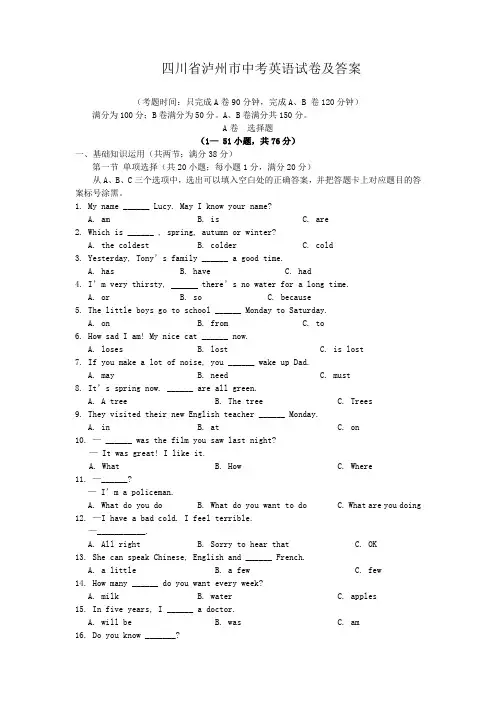
四川省泸州市中考英语试卷及答案(考题时间:只完成A卷90分钟,完成A、B 卷120分钟)满分为100分;B卷满分为50分。
A、B卷满分共150分。
A卷选择题(1— 51小题,共76分)一、基础知识运用(共两节;满分38分)第一节单项选择(共20小题;每小题1分,满分20分)从A、B、C三个选项中,选出可以填入空白处的正确答案,并把答题卡上对应题目的答案标号涂黑。
1. My name ______ Lucy. May I know your name?A. amB. isC. are2. Which is ______ , spring, autumn or winter?A. the coldestB. colderC. cold3. Yesterday, Tony’s family ______ a good time.A. hasB. haveC. had4. I’m very thirsty, there’s no water for a long time.A. orB. soC. because5. The little boys go to school ______ Monday to Saturday.A. onB. fromC. to6. How sad I am! My nice cat ______ now.A. losesB. lostC. is lost7. If you make a lot of noise, you ______ wake up Dad.A. mayB. needC. must8. It’s spring now. ______ are all green.A. A treeB. The treeC. Trees9. They visited their new English teacher ______ Monday.A. inB. atC. on10. — ______ was the film you saw last night?— It was great! I like it.A. WhatB. HowC. Where11. —______?— I’m a policeman.A. What do you doB. What do you want to doC. What are you doing12. —I have a bad cold. I feel terrible.—___________.A. All rightB. Sorry to hear thatC. OK13. She can speak Chinese, English and ______ French.A. a littleB. a fewC. few14. How many ______ do you want every week?A. milkB. waterC. apples15. In five years, I ______ a doctor.A. will beB. wasC. am16. Do you know _______?A. who is heB. who he isC. he is who17.Mary likes dancing. I like it, ______.A. eitherB. alsoC. too18. If you ______ with us, you will be happy.A. goB. will goC. shall go19. You are never too old ______ learn things.A. ofB. toC. in20. Shanghai is a beautiful city, I ______ there before.A. goB. have ever beenC. went第二节完形填空(共12小题;每小题1.5分,满分18分)通读下面的短文,然后从后面各题所给A、B、C三个选项中选择可以填入空白处的最佳答案,并把答题卡上对应题目的答案标号涂黑。
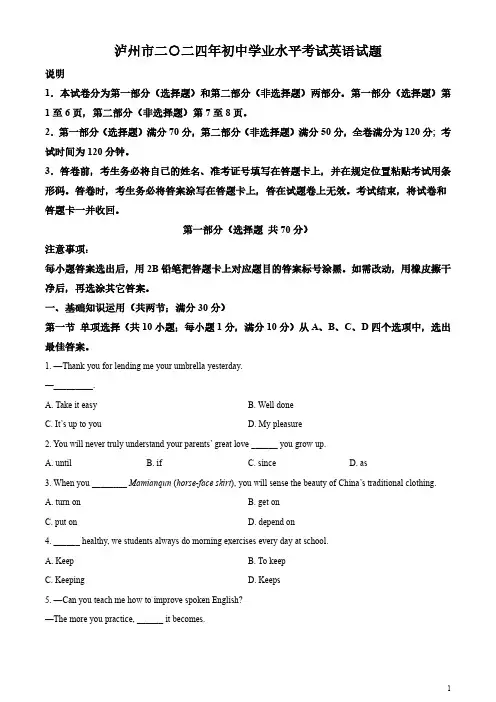
泸州市二○二四年初中学业水平考试英语试题说明1.本试卷分为第一部分(选择题)和第二部分(非选择题)两部分。
第一部分(选择题)第1至6页,第二部分(非选择题)第7至8页。
2.第一部分(选择题)满分70分,第二部分(非选择题)满分50分,全卷满分为120分;考试时间为120分钟。
3.答卷前,考生务必将自己的姓名、准考证号填写在答题卡上,并在规定位置粘贴考试用条形码。
答卷时,考生务必将答案涂写在答题卡上,答在试题卷上无效。
考试结束,将试卷和答题卡一并收回。
第一部分(选择题共70分)注意事项:每小题答案选出后,用2B铅笔把答题卡上对应题目的答案标号涂黑。
如需改动,用橡皮擦干净后,再选涂其它答案。
一、基础知识运用(共两节;满分30分)第一节单项选择(共10小题;每小题1分,满分10分)从A、B、C、D四个选项中,选出最佳答案。
1.—Thank you for lending me your umbrella yesterday.—_________.A.Take it easyB.Well doneC.It’s up to youD.My pleasure2.You will never truly understand your parents’great love______you grow up.A.untilB.ifC.sinceD.as3.When you________Mamianqun(horse-face skirt),you will sense the beauty of China’s traditional clothing.A.turn onB.get onC.put onD.depend on4.______healthy,we students always do morning exercises every day at school.A.KeepB.To keepC.KeepingD.Keeps5.—Can you teach me how to improve spoken English?—The more you practice,______it becomes.A.the worseB.the worstC.the betterD.the best6.—Rebecca,have you decided what to do this Saturday?—Not yet.I______volunteer at the old people’s home.A.mayB.mustC.shouldD.would7.—The best things in life are free.—Couldn’t agree more.Air costs______,but we can’t live without it.A.somethingB.nothingC.anythingD.everything8.—Tom,the high-speed railway(高铁)connecting Luzhou with Chongqing______this year hopefully.—Amazing!I’m looking forward to it!pletesB.is completedC.was completedD.will be completed9.—Hi,Ethan.I called you at8:00last night,but you didn’t answer.—Sorry,I______the dishes.A.washB.washedC.am washingD.was washing10.A true friend is a person________will always be there to share your laughter and tears.A.whatB.whichC.whoD.whom第二节完形填空(共20小题;每小题1分,满分20分)通读下面的短文,然后从后面各题所给A、B、C、D四个选项中选择可以填入空白处的最佳答案。
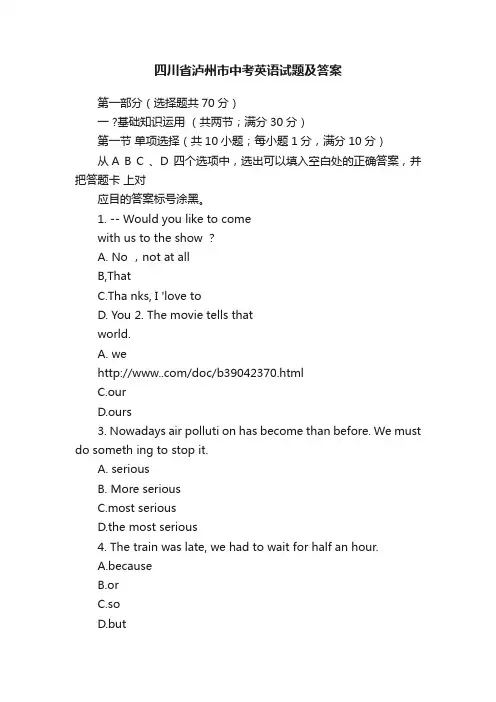
四川省泸州市中考英语试题及答案第一部分(选择题共70分)一 ?基础知识运用(共两节;满分30分)第一节单项选择(共10小题;每小题1分,满分10分)从A B C 、D 四个选项中,选出可以填入空白处的正确答案,并把答题卡上对应目的答案标号涂黑。
1. -- Would you like to comewith us to the show ?A. No ,not at allB,ThatC.Tha nks, I 'love toD. You 2. The movie tells thatworld.A. we/doc/b39042370.htmlC.ourD.ours3. Nowadays air polluti on has become than before. We must do someth ing to stop it.A. seriousB. More seriousC.most seriousD.the most serious4. The train was late, we had to wait for half an hour.A.becauseB.orC.soD.but5. --- will your En glish teacher come back from sha nghai?A.How ofte nB.How soo nC.How farD.How long6. --Hurry up! It 'time to go.--OK.7. --Hello! Is that Mr.Hua ng?--No, he to Che ngdu. He will be back in more tha n two weeks.A.goesB.we nt C,has gone D.has bee n8. Elepha nts are great da nger, we should save them.A.withB.atC.onD.in9. That s our new school,It last year.A.builtB.is builtC.was builtD.will be built10. --That actor knows a lot about Luzhou. Do you know ? _______________A.whe n will he come hereB.whe n he will come hereC.how long he has stayed hereD. How long has he stayed here 第二节完形填空(共20小题;每小题1分,满分20分)通读下面的短文,然后从后面各题所给 A 、B C D 四个选项中选择可以填入空白处的最佳答案,并把答题卡对应题目的答案标号涂黑。

四川省成都市2012年中考英语试题A卷(共100分)A卷I(选择题,共85分)第一部分听力部分(共25小题,计25分)一、听句子,根据所听到的内容选择正确答案。
每小题念两遍。
(共6小题,每小题l分;计6分)1.A.That’s OK. B.I’m fine,thanks C.How’s it goin g? Frank? 2.A.I’m fifteen years old.B.Happy New Year! C.I was born on June 5,1997.3.A.Thank you! B.You are right.C.No, I don’t ca re.4.A.That’s wonderful.B.Sorry,I won’t,C.You are welcome.5.A.It’s my pleasure. B. Have a good trip.C.It do esn’t matter 6.A.Sure,I’d l ove to.B.Oh.I can’t say it.C.Sure, I dislike it.二、听句子。
选择与所听句子内容相符的圈片,并将代表图片的字母填在答题卡的相应位置。
每小题念两遍。
(共4小题,每小题l分;计4分)7.8.9. l0.三、听对话,根据对话内容及问题选择正确答案。
每小题念两遍。
(共l0小题,每小题l分;计10分)11. A. America. B. Canada. C. Australia.12. A. At his home, B. At the school. C. In a hospital.13. A. He doesn't mind them. B. He can't stand them. C. He is interested in them.14. A. Anna. B. Anna's father. C. Anna's mother.15. A. Rainy. B. Windy. C. Hot.16. A. The lions. B. The pandas. C. The tigers.17. A, The town. B. The City Newspaper. C. The best clothing store in town.18. A. Across from Lucy's house. B. Across from the library. C. Across from the bank.19. A. A green sweater. B. A red sweater. C. A white sweater.20. A, A film star. B. A policeman. C. A musician,四、听短文,根据短文内容选择正确答案。
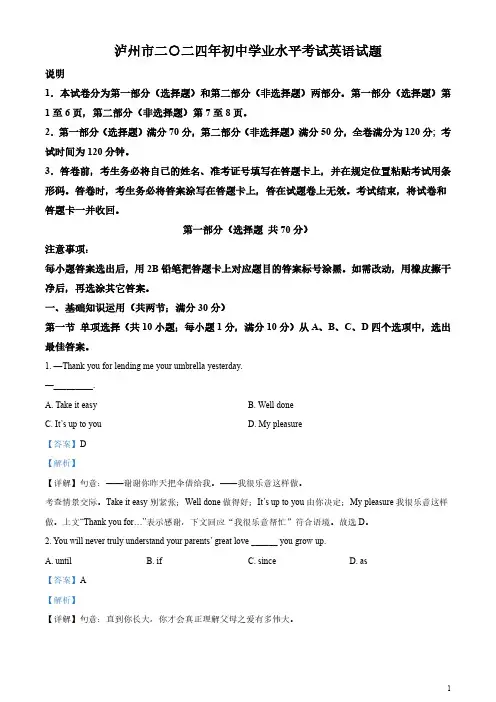
泸州市二○二四年初中学业水平考试英语试题说明1.本试卷分为第一部分(选择题)和第二部分(非选择题)两部分。
第一部分(选择题)第1至6页,第二部分(非选择题)第7至8页。
2.第一部分(选择题)满分70分,第二部分(非选择题)满分50分,全卷满分为120分;考试时间为120分钟。
3.答卷前,考生务必将自己的姓名、准考证号填写在答题卡上,并在规定位置粘贴考试用条形码。
答卷时,考生务必将答案涂写在答题卡上,答在试题卷上无效。
考试结束,将试卷和答题卡一并收回。
第一部分(选择题共70分)注意事项:每小题答案选出后,用2B铅笔把答题卡上对应题目的答案标号涂黑。
如需改动,用橡皮擦干净后,再选涂其它答案。
一、基础知识运用(共两节;满分30分)第一节单项选择(共10小题;每小题1分,满分10分)从A、B、C、D四个选项中,选出最佳答案。
1.—Thank you for lending me your umbrella yesterday.—_________.A.Take it easyB.Well doneC.It’s up to youD.My pleasure【答案】D【解析】【详解】句意:——谢谢你昨天把伞借给我。
——我很乐意这样做。
考查情景交际。
Take it easy别紧张;Well done做得好;It’s up to you由你决定;My pleasure我很乐意这样做。
上文“Thank you for…”表示感谢,下文回应“我很乐意帮忙”符合语境。
故选D。
2.You will never truly understand your parents’great love______you grow up.A.untilB.ifC.sinceD.as【答案】A【解析】【详解】句意:直到你长大,你才会真正理解父母之爱有多伟大。
考查连词辨析。
until直到;if如果;since既然;as随着。
根据“You will never truly understand your parents’great love…you grow up”可知,直到长大才会理解父母的爱,故选A。
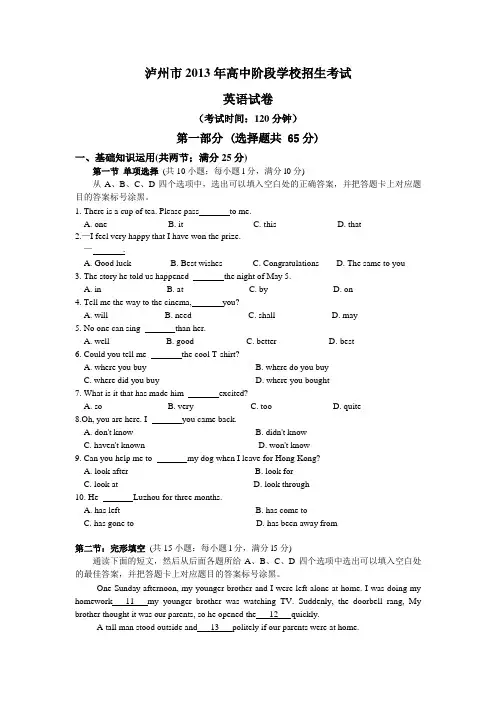
泸州市2013年高中阶段学校招生考试英语试卷(考试时间:120分钟)第一部分 (选择题共 65分)一、基础知识运用(共两节;满分25分)第一节单项选择(共10小题;每小题l分,满分l0分)从A、B、C、D四个选项中,选出可以填入空白处的正确答案,并把答题卡上对应题目的答案标号涂黑。
1. There is a cup of tea. Please pass to me.A. oneB. itC. thisD. that2.—I feel very happy that I have won the prize.—.A. Good luckB. Best wishesC. CongratulationsD. The same to you3. The story he told us happened the night of May 5.A. inB. atC. byD. on4. Tell me the way to the cinema, you?A. willB. needC. shallD. may5. No one can sing than her.A. wellB. goodC. betterD. best6. Could you tell me the cool T-shirt?A. where you buyB. where do you buyC. where did you buyD. where you bought7. What is it that has made him excited?A. soB. veryC. tooD. quite8.Oh, you are here. I you came back.A. don't knowB. didn't knowC. haven't knownD. won't know9. Can you help me to my dog when I leave for Hong Kong?A. look afterB. look forC. look atD. look through10. He Luzhou for three months.A. has leftB. has come toC. has gone toD. has been away from第二节:完形填空(共15小题:每小题l分,满分l5分)通读下面的短文,然后从后面各题所给A、B、C、D四个选项中选出可以填入空白处的最佳答案,并把答题卡上对应题目的答案标号涂黑。
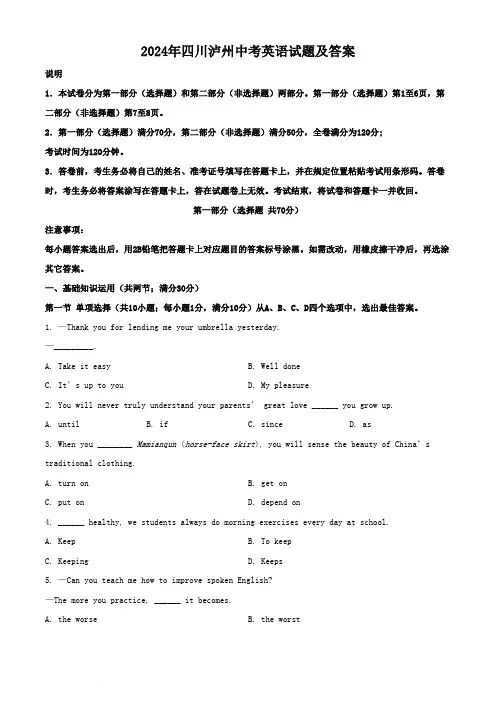
2024年四川泸州中考英语试题及答案说明1.本试卷分为第一部分(选择题)和第二部分(非选择题)两部分。
第一部分(选择题)第1至6页,第二部分(非选择题)第7至8页。
2.第一部分(选择题)满分70分,第二部分(非选择题)满分50分,全卷满分为120分;考试时间为120分钟。
3.答卷前,考生务必将自己的姓名、准考证号填写在答题卡上,并在规定位置粘贴考试用条形码。
答卷时,考生务必将答案涂写在答题卡上,答在试题卷上无效。
考试结束,将试卷和答题卡一并收回。
第一部分(选择题共70分)注意事项:每小题答案选出后,用2B铅笔把答题卡上对应题目的答案标号涂黑。
如需改动,用橡皮擦干净后,再选涂其它答案。
一、基础知识运用(共两节;满分30分)第一节单项选择(共10小题;每小题1分,满分10分)从A、B、C、D四个选项中,选出最佳答案。
1. —Thank you for lending me your umbrella yesterday.—_________.A. Take it easyB. Well doneC. It’s up to youD. My pleasure2. You will never truly understand your parents’ great love ______ you grow up.A. untilB. ifC. sinceD. as3. When you ________ Mamianqun (horse-face skirt), you will sense the beauty of China’s traditional clothing.A. turn onB. get onC. put onD. depend on4. ______ healthy, we students always do morning exercises every day at school.A. KeepB. To keepC. KeepingD. Keeps5. —Can you teach me how to improve spoken English?—The more you practice, ______ it becomes.A. the worseB. the worstC. the betterD. the best6. —Rebecca, have you decided what to do this Saturday?—Not yet. I ______ volunteer at the old people’s home.A. mayB. mustC. shouldD. would7. —The best things in life are free.—Couldn’t agree more. Air costs ______, but we can’t live without it.A. somethingB. nothingC. anythingD. everything8. —Tom, the high-speed railway (高铁) connecting Luzhou with Chongqing ______ this year hopefully.— Amazing! I’m looking forward to it!A. completesB. is completedC. was completedD. will be completed9. —Hi, Ethan. I called you at 8:00 last night, but you didn’t answer.—Sorry, I ______ the dishes.A. washB. washedC. am washingD. was washing10. A true friend is a person ________ will always be there to share your laughter and tears.A. whatB. whichC. whoD. whom第二节完形填空(共20小题;每小题1分,满分20分)通读下面的短文,然后从后面各题所给A、B、C、D四个选项中选择可以填入空白处的最佳答案。
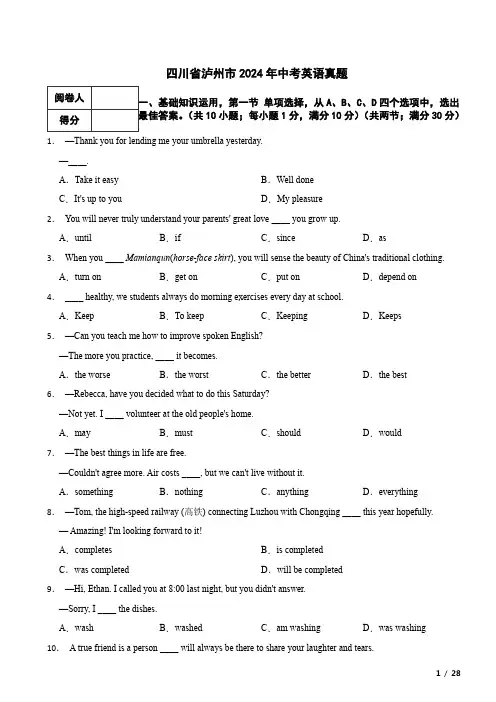
四川省泸州市2024年中考英语真题单项选择,从A、B、C、D四个选项中,选出(共10小题;每小题1分,满分10分)(共两节;满分30分)1.—Thank you for lending me your umbrella yesterday.—____.A.Take it easy B.Well doneC.It's up to you D.My pleasure2.You will never truly understand your parents' great love ____ you grow up.A.until B.if C.since D.as3.When you ____ Mamianqun(horse-face skirt), you will sense the beauty of China's traditional clothing.A.turn on B.get on C.put on D.depend on4.____ healthy, we students always do morning exercises every day at school.A.Keep B.To keep C.Keeping D.Keeps5.—Can you teach me how to improve spoken English?—The more you practice, ____ it becomes.A.the worse B.the worst C.the better D.the best 6.—Rebecca, have you decided what to do this Saturday?—Not yet. I ____ volunteer at the old people's home.A.may B.must C.should D.would7.—The best things in life are free.—Couldn't agree more. Air costs ____, but we can't live without it.A.something B.nothing C.anything D.everything 8.—Tom, the high-speed railway (高铁) connecting Luzhou with Chongqing ____ this year hopefully.— Amazing! I'm looking forward to it!A.completes B.is completedC.was completed D.will be completed9.—Hi, Ethan. I called you at 8:00 last night, but you didn't answer.—Sorry, I ____ the dishes.A.wash B.washed C.am washing D.was washing10.A true friend is a person ____ will always be there to share your laughter and tears.A.what B.which C.who D.whom完形填空(共20小题;每小题1分,满分20通读下面的短文,然后从后面各题所给A、B、C、D四个选项中选择可以填入空白处的最佳答案。
泸州市二0一二年高中阶段学校招生统一考试英语试卷第Ⅰ卷选择题(一至二大题,共65分)一、基础知识运用(共两节;满分25分)第一节单项选择(共10小题;每小题l分,满分l0分)从A、B、C、D四个选项中,选出可以填入空白处的正确答案,并把答题卡上对应题目的答案标号涂黑。
1. As we know, the Huanghe River is one of rivers in our country.A. longB. longerC. longestD. the longest2.—I'll go on a picnic with my classmates tomorrow.—A. You make itB. That's all rightC. Have a good timeD. It doesn't matter3. Each of the foreigners holds a fork in one hand and a knife inA. othersB. the othersC. the otherD. another4. It's time for sports! your sports shoes, please!A. Put upB. Put onC. Take OffD. Take away5. Your advice is good. I'll it.A. takeB. makeC. forgetD. give6. Andy often helps her mother the housework on Sunday afternoon.A. toB. ofC. forD. With7. —Keep quiet, please. They a meeting.—Sorry.A. haveB. have hadC. are havingD. had8.—Could you tell me how long the book?—Three days.A. may I borrowB. I may keepC. I may borrowD. may I keep9. Tom didn't go to school yesterday he was ill.A. asB. soC. becauseD. while10. —Congratulations on your success!—A. ThanksB. You're welcomeC. Don't mention itD. You're too polite第二节:完形填空(共15小题;每小题l分,满分l5分)通读下面的短文,然后从后面各题所给A、B、C、D四个选项中选出可以填入空白处的最佳答案,并把答题卡上对应题目的答案标号涂黑。
一、选择题1.Even though we're in difficult times, we need to keep hope .A.real B.alive C.fresh D.close B解析:B【详解】句意:即使我们处在困难时期,我们也需要保持希望不灭。
考查形容词辨析。
A. real 真的;B. alive 活着的; C. fresh 新鲜的;D. close亲密的。
keep+sth+形容词。
结合句意和语境,故选B。
2.On my way to school, Lucy’s father ______ me a lift in his car.A.gave B.made C.asked D.took A解析:A【解析】【详解】句意:在我去学校的路上,Lucy的爸爸让我搭他的车。
gave给,是give的过去式;made 制作,是make的过去式;asked问;took带走。
这里考查固定短语give sb. a lift,让某人搭车。
故应选A。
3.When I heard of this news, Mary and Jim ______ already ______ for two months. A.was; married B.had; married C.had; been married D.have; been married C解析:C【解析】【详解】句意:当我听到这个消息的时候,Mary和Jim已经结婚两个月了。
was married一般过去时;had married过去完成时;had been married是系表结构,表示“已婚”的状态;have been married现在完成时。
根据句意可知,主句谓语动词发生在从句谓语动词heard之前,应用过去完成时,句中for two months是一段时间,故用系表结构表示状态,应选C。
4.The boy is sleeping. Please the radio.A.turn up B.turn offC.turn on D.turn down B解析:B【详解】句意:那男孩正在睡觉。
四川省泸州市中考英语试题及答案2016年四川省泸州市中考英语试题第⼀部分(选择题共70分)⼀.基础知识运⽤(共两节;满分30分)第⼀节单项选择(共10⼩题;每⼩题1分,满分10分)从A、B、C、D四个选项中,选出可以填⼊空⽩处的正确答案,并把答题卡上对应⽬的答案标号涂⿊。
1.--I’m going to Ann’s birthday part. Bye, mom.-- ,Jack!A.Have funB. No problemC. Best wishesD. Take care2.--Whose T-shirt is this Is it Sally’s-- No, it isn’t. is white.A.MyB. MineC. HerD. Hers3.As we know, the Yangtze River is one of rivers in the world.A.longB. longerC. longestD. The longest4.You can’t pass the exam you study hard.A.ifB. asC. forD. Unless5.You should smoking. It’s really bad for your health.A.put upB. give upC. get upD. set up6.On her birthday, she got an iPad as a gift from her father.A.twelveB. twelfthC. the twelveD. the twelfth7.--Jenny, when did you move here-- I here for three years.A.livedB. movedC. have movedD. have lived8.--Is that girl under the tree Mary--No, it be Mary. She is in Beijing Now.A. can’tB. needn’tC.wouldn’tD. shouldn’t9.Every year many trees along the streets to make our city more beautiful.A. plantB. have plantedC. Are plantedD. were planted10. --Do you know--Tomorrow afternoon.A.when will the headmaster give us a talkB. where will the headmaster give us a talkC. when the headmaster will give us a talkD. where the headmaster will give us a talk第⼆节完形填空(共20⼩题;每⼩题1分,满分20分)通读下⾯的短⽂,然后从后⾯各题所给A、B、C、D四个选项中选择可以填⼊空⽩处的最佳答案,并把答题卡对应题⽬的答案标号涂⿊。
泸州市二○二四年初中学业水平考试英语试题第一部分(选择题共70分)一、基础知识运用(共两节;满分30分)第一节单项选择(共10小题;每小题1分,满分10分)从A、B、C、D四个选项中,选出最佳答案。
1.—Thank you for lending me your umbrella yesterday.—_________.A.Take it easyB.Well doneC.It’s up to youD.My pleasure2.You will never truly understand your parents’great love______you grow up.A.untilB.ifC.sinceD.as3.When you________Mamianqun(horse-face skirt),you will sense the beauty of China’s traditional clothing.A.turn onB.get onC.put onD.depend on4.______healthy,we students always do morning exercises every day at school.A.KeepB.To keepC.KeepingD.Keeps5.—Can you teach me how to improve spoken English?—The more you practice,______it becomes.A.the worseB.the worstC.the betterD.the best6.—Rebecca,have you decided what to do this Saturday?—Not yet.I______volunteer at the old people’s home.A.mayB.mustC.shouldD.would7.—The best things in life are free.—Couldn’t agree more.Air costs______,but we can’t live without it.A.somethingB.nothingC.anythingD.everything8.—Tom,the high-speed railway(高铁)connecting Luzhou with Chongqing______this year hopefully.—Amazing!I’m looking forward to it!pletesB.is completedC.was completedD.will be completed9.—Hi,Ethan.I called you at8:00last night,but you didn’t answer.—Sorry,I______the dishes.A.washB.washedC.am washingD.was washing10.A true friend is a person________will always be there to share your laughter and tears.A.whatB.whichC.whoD.whom第二节完形填空(共20小题;每小题1分,满分20分)通读下面的短文,然后从后面各题所给A、B、C、D四个选项中选择可以填入空白处的最佳答案。
2023-2024学年四川泸州人教版中考专题英语中考真卷学校:__________ 班级:__________ 姓名:__________ 考号:__________注意事项:1.答题前填写好自己的姓名、班级、考号等信息;2.请将答案正确填写在答题卡上;一、单选题(本大题共计9小题,每题3分,共计27分)1.Tony is ______ of the three boys, but he is the tallest.A. youngB. youngerC. youngestD. the youngest【答案】D【解析】D 考查形容词最高级。
句意:Tony是三个男孩中最小的,但是他是最高的。
根据of the three boys可知是在三个男孩中作比较,空处应填形容词最高级,最高级通常由the修饰。
the+形容词的最高级,意为:最……的。
故选D。
2.—Look at the sign, "No Parking".—Sorry, I ________ see it.A: dont, B: didnt, C: couldnt【答案】B【解析】B 考查一般过去时。
根据分析可知句意:——看那个“禁止停车”的标志。
——对不起,我没看到它。
根据分析可知没有看到这个标志是过去发生的事情,所以空处所在句的时态为一般现在时,且为否定句,且这里表示“我没看到它”,所以需要借助助动词didn't,后接动词原形。
3.—Do you know ________ Beijing?—I'm not sure, by high-speed railway, I guess.A. when will he go toB. why he will go toC. how did he go toD. how he went to【答案】D【解析】D 考查宾语从句。
句意:——你知道他是怎么去北京的吗?——我不确定,我想是坐高速铁路吧。